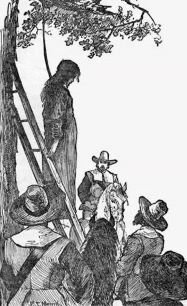Mayflower Murderer
Born This Day Series, Social Media Content
September 30th marks the day that the first white American was executed for the murder of another white American.
The Mayflower arrived at Plymouth in December 1620, with 102 passengers, half of whom had come for religious reasons. The were the ‘Saints’, who were anti-Catholic Protestants. The others were ‘Strangers’, a mishmash of people who’d been recruited to fill the ship and make the voyage profitable.
One Stranger was a wealthy English businessman named John Billington. He was looking for new opportunities, and to escape creditors. If he wasn’t Catholic, he was High Anglican, which was just as extreme at the time. He was crude, foul-mouthed and a trouble-maker; when the ship was blown off course, Billington led a group threatening mutiny. While his fellow passengers shivered in miserable conditions, he was able to afford the comfort of a private cabin. His son set off a charge that caused a serious fire on board. And after their arrival at Plymouth, William Bradford’s wife somehow fell overboard; it was suspected that Billington’s sons had something to do with the ‘accidental death’.
By the time they landed, the colonists were already suffering from disease—likely typhoid. While half died, the Billingtons took care of themselves. John balked at the idea of military service, repeatedly challenged orders, and was implicated in the plot to revolt against Puritan rule. His wife got involved too, earning a whipping and a day in the stocks for slandering authorities. Bradford called Billington a “knave” and his clan "one of the profanest families amongst them."
Of equally serious import was the fact that the Saints were outnumbered by Strangers. Saints worried that the entire settlement would dissolve into "the Devil's hands" so, to make sure that governorship of the colony remained under their control, they elected, and constantly re-elected, their governor—William Bradford.
By 1630, the town of Plymouth was established. With it came crime. Criminal justice was in the hands of Bradford’s Saints—there were no laws aside from theirs, and they could be as merciful, or merciless, as they chose. Walter Palmer (Saint) beat to death Austin Bratcher (Stranger). Palmer was convicted of manslaughter and released.
John Billington now owned land, and he had a problem with a poacher, the young Saint John Newcomen. Private property rights were newly important and the settlement retained the English practice of shooting poachers. Newcomen was 17, careless and not bright, so Billington just kept warning him off. But, one day, Billington caught Newcomen raiding his traps. Newcomen ran, and Billington fired a warning shot which caught the boy in the shoulder. He died of gangrene a few weeks later. Billington was tried by jury, found guilty and publicly hanged.
His name does live on. In 1621, his son discovered a large pond and declared that he'd found the Pacific Ocean. In memory of the comical error, it was named ‘Billington’s Sea’; it is still so-named and is a Plymouth park.

